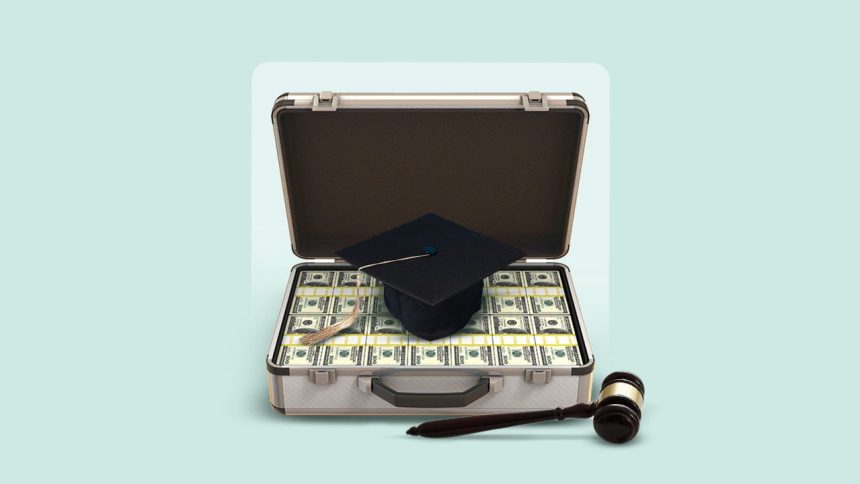Photography by Getty Images; Illustration by Bankrate
Key takeaways
- Defaulted student loans can impact your credit report for years, limiting your access to credit.
- There is no statute of limitations on federal student loans.
- The statute of limitations on private student loans ranges from three to 10 years depending on their state of origin.
- There are ways to get help if your loans are in default or headed for default.
A statute of limitations is a legal time limit that creditors and debt collectors must follow when collecting a debt. More specifically, the statute of limitations on debt governs how long a creditor can sue you to collect an unpaid debt. For contractual debts like private student loans, states typically limit the debt collection time frame to somewhere between three and 10 years.
Defaulting on your student loans, whether federal or private, has a serious and long-lasting impact on your finances. If you’re in default, it’s important to understand the statute of limitations, how that affects the way creditors can recover money from you and what options you have for discharging your debts.
Federal student loans vs. private student loans
The statute of limitations on student loans depends on whether you have federal or private student loans, and when it starts can vary for private loans. Location affects private loans because you may be subject to the laws of the state where you took out your loan.
Federal student loans
Because federal student loans do not have a statute of limitations, defaulted debts or collection accounts can remain on your credit report indefinitely. Only after you pay your federal student loans can the default be removed from your credit reports — and even then, it will still take seven years from the time of repayment for those accounts to be removed.
Federal law limits how long most types of negative information can remain on your credit report. In most cases, the FCRA allows defaulted debts or collection accounts to stay on your credit report for up to seven years.
The point when your federal student loans enter default depends on the type of loans you have:
- William D. Ford Federal Direct Loan: After 270 days of nonpayment
- Federal Family Education Loan: After 270 days of nonpayment
- Federal Perkins Loan: After first missed payment
Penalties on defaulted federal loans
- Your entire unpaid balance becomes due immediately.
- Your wages may be garnished.
- You could lose your tax refunds and federal benefit payments.
- You lose the options for deferment, forbearance and choosing a repayment plan.
- Your default is reported to credit bureaus, impacting your ability to get new credit or make large purchases such as cars or houses.
- Your school may withhold your transcripts, which could affect your ability to transfer or enroll in schools or apply for some jobs.
Private Student Loans
While defaulted private student loans will be removed from your credit score after seven years, their impact on your credit can be long-lasting. Having loans in default will make it much more difficult to open credit cards, get an auto loan or qualify for a mortgage. If you have loans in default, it’s important to start rebuilding your credit score as soon as possible.
Here are steps lenders can take before the statute of limitations expires:
- Increasing rates and fees
- Taking legal action
- Garnishing wages
- Enforcing debt collection
- Reporting to credit bureaus
Student loan statute of limitations by state
Your loan agreement may state the statute of limitations on your loan in a section called “default” or “repayment terms.” If your loan agreement does not state the statute of limitations, contact your state attorney general or a lawyer experienced with student loan default.
The statute of limitations on student loans varies by state:
| State | Statute of limitations (years) |
|---|---|
| Alabama | 6 |
| Alaska | 3 |
| Arizona | 6 |
| Arkansas | 5 |
| California | 4 |
| Colorado | 6 |
| Connecticut | 6 |
| Delaware | 6 |
| Florida | 5 |
| Georgia | 6 |
| Hawaii | 6 |
| Idaho | 5 |
| Illinois | 10 |
| Indiana | 6 |
| Iowa | 10 |
| Kansas | 5 |
| Kentucky | 15 |
| Louisiana | 3 |
| Maine | 6 |
| Maryland | 3 |
| Massachusetts | 20 |
| Michigan | 6 |
| Minnesota | 6 |
| Mississippi | 3 |
| Missouri | 10 |
| Montana | 8 |
| Nebraska | 5 |
| Nevada | 6 |
| New Hampshire | 6 |
| New Jersey | 6 |
| New Mexico | 6 |
| New York | 6 |
| North Carolina | 3 |
| North Dakota | 6 |
| Ohio | 8 |
| Oklahoma | 5 |
| Oregon | 6 |
| Pennsylvania | 4 |
| Rhode Island | 10 |
| South Carolina | 3 |
| South Dakota | 6 |
| Tennessee | 6 |
| Texas | 4 |
| Utah | 6 |
| Vermont | 6 |
| Virginia | 5 |
| Washington | 6 |
| Washington, D.C. | 3 |
| Wisconsin | 6 |
| Wyoming | 10 |
| Source: The College Investor |
What happens when the statute of limitations expires?
An expired statute of limitations prohibits a creditor or collection agency from suing you, but you may continue to receive letters and phone calls requesting repayment as long as your creditor abides by the Fair Debt Collection Practices Act (FDCPA). The account may also stay on your credit reports.
Keep in mind:
Once the statute of limitations runs out on a debt, it is considered “time-barred,” but it’s important to know time-barred debt isn’t the same thing as debt forgiveness.
How the statute of limitations can be extended or restarted
The statute of limitations on your private student loans can reset or restart if you:
- Make at least a partial payment on your debt
- Make a promise in writing to pay at least part of your debt
- Acknowledge that you owe the debt
It can also be extended through a process called “tolling.” If you miss a loan payment, your lender might extend the deadline for repayment rather than moving your account into default. This delays the statute of limitations from starting, giving the lender more time and legal power to recover the debt.
Bankrate’s take:
It is not recommended to ask your lender about the statute of limitations on your loan. Doing this acknowledges your debt and could have legal consequences.
Discharging student loans through bankruptcy
Federal loans
Federal student loans can be discharged under certain circumstances. You will need to apply for discharge on StudentAid.gov using the correct form for your type of discharge.
There are several ways to qualify, but common ones include:
- Working in certain fields
- Becoming unable to work
- Being a victim of fraud
- Passing away
Private loans
It can be difficult to discharge private student loans, especially since some lenders include mandatory arbitration clauses in their loan agreements. Depending on the lender, your private student loans may be forgiven if you become disabled or die — but in other cases, your student loan debt can be inherited by your survivors.
You may be able to discharge some or all of your private student loans if you file for bankruptcy. Discharge requires you prove to the court that repaying your loans would cause undue financial hardship. The process of discharging private student loans in bankruptcy is complicated and varies based on jurisdiction, so it’s essential to consult a bankruptcy lawyer before beginning the process.
Bottom line
Defaulting on student loans will make your financial life difficult by damaging your credit history and credit score. Defaulted private student loans will stay on your credit report for up to seven years, but federal student loans have no statute of limitations.
If you’re struggling with defaulted federal student debt, consider whether student loan rehabilitation or consolidation could benefit you. With defaulted private student loans or federal loans where consolidation or rehabilitation isn’t an option, speak with a student loan attorney or an organization that offers student loan help for personalized advice.
Read the full article here














